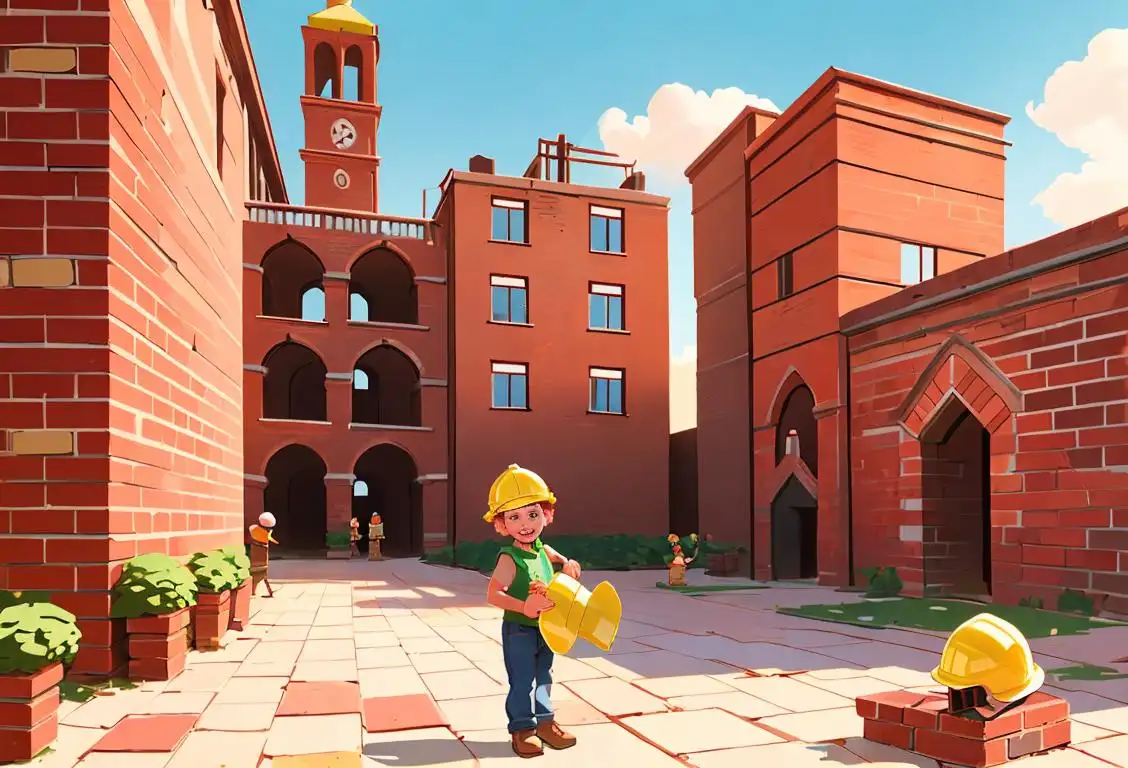National Brick Day

Sometimes, life hits you like a ton of bricks, but not on April 14th! Say hello to National Brick Day, an uplifting and surprisingly fun celebration of everyone's favorite building block. Let's build an understanding of how this unique day cemented its place in the annals of online history.
When is Brick Day?
It's national brick day on the 14th April.
Building Bricks of History
The humble brick may not be the first thing that comes to mind when you think of 'exciting', but National Brick Day has been challenging that preconception since its online inception in 2016, where it garnered an impressive 213 mentions! It was the day when cyberspace became bricked space. The highest number of mentions were seen on April 14th of that year, cementing that date as the unofficial 'National Brick Day'.
Bricks in Pop Culture
Of course, we can't ignore how bricks have stealthily become a part of pop culture, thanks to those colorful and creative Lego bricks we all loved (or loathed) stepping on when we were kids. But, don't let that fool you into thinking National Brick Day is just for young ones. This day has a universal appeal, it's for everyone who is into fun, property and even finance, given the long-standing relationship between bricks and investment in real estate!
Building Bonds, One Brick at a Time
If you thought that bricks were only for construction, think again. They build walls and houses, yes, but they also build memories and bonds. Many people find joy and happiness in creating beautiful things from these rectangular blocks, encouraging their creativity and patience. If that's not worth celebrating, what is?
History behind the term 'Brick'
3000 BC
Early Beginnings
The term 'brick' finds its origins in ancient civilization, as early as 3000 BC. The earliest known examples of bricks were found in the region of Mesopotamia, present-day Iraq. These early bricks were made of clay and sun-dried, forming basic building blocks for construction.
2500 BC
Fired Bricks
Around 2500 BC, the technique of firing bricks in kilns was developed by the ancient Egyptians. This revolutionary innovation involved baking the clay bricks in ovens, resulting in stronger, more durable building material. Fired bricks allowed for the construction of larger and more complex structures, such as the magnificent pyramids.
800 BC
The Roman Influence
During the Roman Empire, bricks became widely used in construction. The Romans further enhanced brick-making techniques by adding materials like lime and volcanic ash to the clay mixture, resulting in even stronger bricks. This technology spread across Europe and played a crucial role in the construction of roads, aqueducts, and large-scale buildings.
1700s
Industrial Revolution and Modernization
With the advent of the Industrial Revolution in the 18th century, the process of brick-making underwent significant changes. Machines were developed to automate the production of bricks, increasing efficiency and quantity. This led to a rapid urbanization and the use of bricks became a defining characteristic of the modern built environment.
20th Century
Variety and Innovation
In the 20th century, brick manufacturing saw further advancements in technology and design. Different types of bricks were developed, including engineering bricks for heavy-duty applications and facing bricks for aesthetic purposes. Innovations like hollow bricks with better insulation properties also emerged, improving energy efficiency in buildings.
Present Day
Bricks in Contemporary Construction
In modern times, bricks continue to be a popular choice in construction due to their durability, versatility, and aesthetic appeal. They provide a timeless charm to architectural designs and are environmentally friendly, as they can be recycled. The term 'brick' has become synonymous with solid, reliable construction materials, representing the evolution of human ingenuity over thousands of years.
Did you know?
Did you know there are more than 10,000 different types of bricks in the world? That's a whole lot of building possibilities!Tagged
fun finance property family creativity construction architectureFirst identified
14th April 2016Most mentioned on
14th April 2016Total mentions
213Other days
Brick Day
Daughters Day
Coloring Book Day
Veterans Day
Opposite Day
Happiness Day
Seniors Day
Suicide Prevention Month Day
Honesty Day
Action Day








